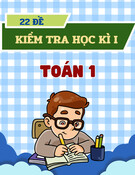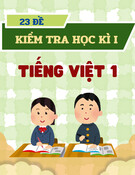
TR NG THPT CHUYÊNƯỜ
NGUY N B NH KHIÊMỄ Ỉ
Đ THI H C KÌ IỀ Ọ NĂM H C 2019-2020Ọ
Môn thi: TI NG ANH – KH I 10Ế Ố
Th i gian làm bài:ờ 60 phút
A – MULTIPLE CHOICE (4 đi m)ể
Question 1. (TH) Mark the letter A, B, C or D to indicate the word which is stressed differently from that
of the rest.
A. initial B. inherit C. occurrence D. occupy
Question 2. (NB) Mark the letter A, B, C or D to indicate the word whose underlined part is pronounced
differently from that of the rest.
A. design B. resist C. desire D. consultant
Question 3. (NB) Joan definitely wishes she _______ to do all the housework.
A. doesn’t have B. didn’t have C. wouldn’t have D. hadn’t
Question 4. (TH) ________ any heavier, we’d never have made it on time.
A. Were the traffic B. Had the traffic been
C. Should the traffic be D. Be the traffic
Question 5. (TH) The companies appear _______ the water supply in this area for a long time.
A. to foul B. to be fouled C. to be fouting D. to have been fouling
Question 6. (TH) It is mandatory that smoking in public _______.
A. prohibited B. prohibit C. be prohibited D. is prohibited
Question 7. (VD) Please accept our _____ congratulations.
A. finest B. deepest C. dearest D. warmest
Question 8. (TH) Sally would prefer to pursue her studies_________ to look for a job.
A. rather than starting B. to starting
C. rather than start D. than to start
Question 9. (TH) Cars have been banned from the city centre, which makes the area much safer for
_____.
A. passersby B. onlookers C. pedestrians D. footmen
Question 10. (VD) There have been a real boom in_______ electronics over the last three decades.
A. consumer B. customer C. buyer D. client
Question 11. (TH) The rules are clearly stated and admit ________ no confusion.
A. to B. for C. of D. from
Question 12. (NB) Mark the letter A, B, C or D to indicate the word which is stressed differently from
that of the rest.
A. uptake B. update C. upgrade D. upstage
Question 13. (TH) Mark the letter A, B, C or D to indicate the word whose underlined part is pronounced
differently from that of the rest.
A. retake B. rewrite C. recollect D. rearrange
Question 14. (TH) ________? - Yes, the clock says nine o'clock.
A. Is it time to leave B. Is it free time
C. Is time long time D. What's the time
Question 15. (NB) Shall we go out or stay at home? — Which _____ do yourself?

A. would you rather B. will you rather
C. do you rather D. should you rather
Question 16. (VD) _______ the public concern about the local environment, this new road scheme will
have to be abandoned.
A. As regards B. In the event of
C. However much D. In view of
Mark the letter A, B, C, or D to show the underlined part that needs correction.
Question 17. (NB) (A) Of all the capitals (B)in the world, Bangkok is (C) the one I would (D) like
more to visit.
Question 18. (TH) (A) Early in United States history, the rights of (B) woman were championed in
Wyoming, the state (C) where they (D) were first guaranteed the right to vote.
Question 19. (NB)(A) Although it has (B) been raining (C) heavily for hours, the whole village
is (D) flooded.
Question 20. (VD) Reading (A) can be a way(B) to escape from a bad day, a way to (C) self-entertain,
and a tool which students can use to succeed(D) for many other subjects.
READING
Mark the letter A, B, C or D to indicate the correct word for each of the blanks.
The return of the airship
The first balloon flew in the 18th century. By 1900 the Germans were producing rigid airships capable of
carrying (21)______ loads over long distances. These airships consisted of a cigar shaped, covered frame
containing hydrogen gas. The first craft reached speeds (22) ______ 32 km/h. By the mid 1930s, the
zeppelins had doubled in size. The largest airship ever built, the Hindenburg, was 245 metres long and
could reach a maximum speed of 135 km/h. In 1936, this airship carried a (23)_____ of 1,002 passengers
on 10 scheduled round trips between Germany and the United States. On 6 May 1937, while (24)___ at
Lakehurst, New Jersey, the Hindenburg was completely destroyed when it crashed and burst into
(25)_____, with a loss of 36 lives. Now, over 60 years since the last giant commercial airship was built, a
new breed of high tech giant airships is being planned.
Question 21. (TH) A. strong B. considerable C. notable D. important
Question 22. (VD) A. arriving B. almost C. nearly D. approaching
Question 23. (NB) A. total B. sum C. figure D. number
Question 24. (TH) A. grounding B. getting down C. landing D. returning
Question 25. (VD) A. flames B. fires C. blazes D. burns
IV. Read the passage and then choose the correct answer for each blank.
MUSICAL TALENT
Among all the abilities with which an individual may be endowed, musical talent appears earliest in life.
Very young children can exhibit musical precocity for different reasons. Some develop exceptional skill
as a result of a well-designed instructional regime, such as the Suzuki method for the violin. Some have
the good fortune to be born into a musical family in a household filled with music. In a number of
interesting cases, musical talent is part of an otherwise disabling condition such as autism or mental
retardation. A musically gifted child talent; however, the extent to which the talent is expressed publicly
will depend upon the envirionment in which the child lives.

Musically gifted children master at an early age the principal elements of music, including pitch and
rhythm. Pitch – or melody – is more central in certain cultures, for example, in Eastern societies that make
use of tiny quarter – tone intervals, sounds produced at certain-auditory frequencies and grouped
according to a prescribed system, is emphasized in sub — Saharan Africa, where the rhythmic ratios can
be very complex.
All children have some aptitude for making music. During infancy, normal children sing as well as
babble, and they can produce individual sounds and sound patterns. Infants as young as two months can
match their mother’s songs in pitch, loudness, and melodic shape, and infants at months can match
rhythmic structure as well. Infants are especially predisposed to acquire these core aspects of music, and
they can also engage in sound play that clearly exhibits creativity.
Individual differences begin to emerge in young children as they learn to sing. Some children can match
large segments of a song by the age of two or three. Many others can only approximate pitch at this age
and may still have difficulty in producing accurate melodies by the age of five or six. However, by the
time they reach school age, most children in any culture have a schema of what a song should be like and
can produce a reasonably accurate imitation of the songs commonly heard in their environment.
The early appearance of superior musical ability in some children provides evidence that musical talent
may be a separate and unique form of intelligence. There are numerous tales of young artists who have a
remarkable “ear” or extraodinary memory for music and natural understanding of musical structure. In
many of these cases, the child is average in every other way but displays an exceptional ability in music.
Even the most gifted child, however, takes about ten years to achieve the levels of performance or
composition that would constitute mastery of the musical sphere.
Every generation in music history has had its famous prodigies – individuals with exceptional musical
powers that emerge at a young age. In the 18th century, Wolfgang Amadeus Mozart began composing and
performing at the age of six. As a child, Mozart could play the piano like an adult. He had perfect pitch,
and at age nine he was also a master of the art of modulation – transitions from one key to another –
which became one of the hallmarks of his style. BY the age of eleven, he had composed three symphonics
and 30 other major works. Mozart’s well-developed talent was preserved into adulthood.
Unusual musical ability is a regular characteristic of certain anomalies such as autism. In one case, an
autistic girl was able to play “Happy birthday” in the style of various composers, including Mozart
Beethoven, Verdi, and Schubert. When the girl was three, her mother called her by playing incomplete
child, music may be the primary mode of communication, and the child may cling to music because it
represents a haven in a world that is largely confusing and frightening.
Question 26. (NB) The author makes the point that musical elements such as pitch and rhythm _____.
A. distinguish music from other art forms
B. vary in emphasis in different cultures
C. make music difficult to learn
D. express different human emotions
Question 27. (TH) According to the passage, when does musical talent usually begin to appear?

A. when infants start to babble and produce sound patterns
B. between the ages of two and four months
C. when children team to sing at two or three years old
D. between ten years old and adolescence
Question 28. (TH) According to the passage, which of the following suggests that musical talent is a
separate form of intelligent?
A. exceptional musical ability in an otherwise average child.
B. recognition of the emotional power of music.
C. the ability of all babies to acquire core elements of music.
D. differences between learning music and learning language
Question 29. (VD) All of the following are given as examples of exceptional musical talent EXCEPT
____.
A. a remarkable “ear” or perfect memory for music
B. ability to compose major works at a young age
C. appreciation for a wide variety of musical styles
D. playing a single song in the style of various composers
Question 30. (VDC) Which of the following can be inferred from the passage about exceptional musical
ability?
A. It occurs more frequently in some cultures than in others.
B. It is evidence of a superior level of intelligence in other areas.
C. It has been documented and studied but is little understood.
D. It is the result of natural talent and a supportive environment.
B-WRITING (2 đi m)ể
I. Rewrite the following sentences so that they have the same meanings as the original ones.
Question 31. (TH) This bridge will take us three years to complete.
=> In three years’ time __________.
Question 32. (VD) There’s nothing better to do, so go home.
=> You may ________.
Question 33. (TH) The project received the unanimous approval of the committee. (FAVOUR)
=> The whole__________.
Question 34. (TH) Jane’s husband will be returning from South America quite soon.
=> It won’t ________.
Question 35. (NB) That old typewriter is not worth repairing. (POINTLESS)
=> Repairing __________.
PARAGRAPH WRITING
In about 150 words, write a paragraph about the changes that information technology bring to your
society.
------------------THE END------------------




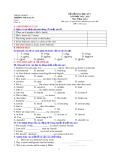
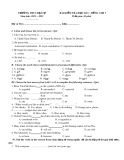
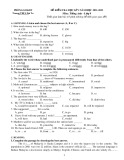
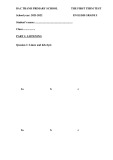
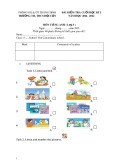


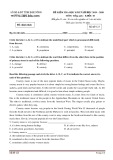



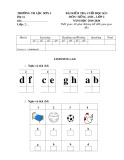





![Đề thi học kì 2 Tiếng Anh lớp 10 năm 2019-2020 có đáp án trường THPT Đoàn Thượng (Chương trình mới) [Download]](https://cdn.tailieu.vn/images/document/thumbnail/2021/20210217/jiayounanhai/135x160/2951613536931.jpg)





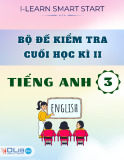





![Đề thi Tiếng Anh có đáp án [kèm lời giải chi tiết]](https://cdn.tailieu.vn/images/document/thumbnail/2025/20250810/duykpmg/135x160/64731754886819.jpg)
